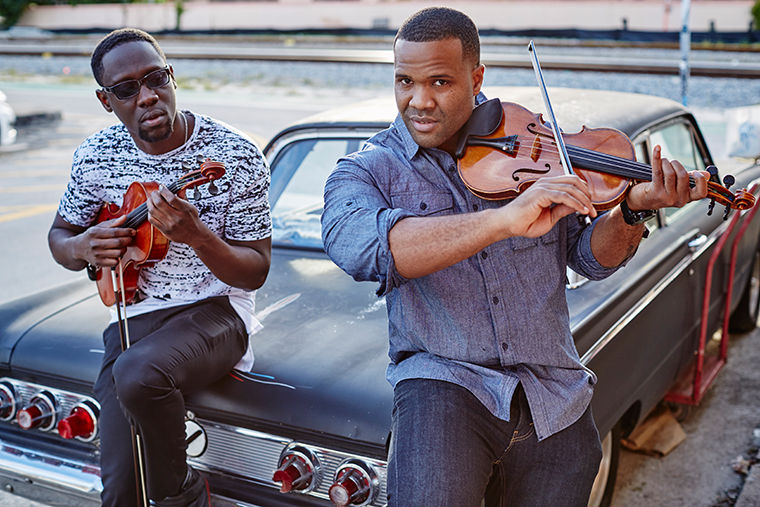Black Violin talks breaking stereotypes
Black Violin mixes hip-hop and classical to create a unique sound that has garnered the duo musical success.
November 6, 2017
Black Violin is all about subverting stereotypes. The hip-hop/classical fusion duo of violinist Kevin Sylvester and violist/vocalist Wil Baptiste is a disruption all its own.
It is certainly unexpected that urban hip-hop could be successfully mixed with the classical genre, but Baptiste and Sylvester—both black men—have successfully pulled it off since they united in high school.
The two have seen success that included a performance at former president Barack Obama’s inaugural ball in 2013 following the release of 2012’s Classically Trained.
Black Violin’s major label debut came in the form of 2015’s Stereotypes, released by Universal Music Classics. Now the duo is producing its next album and finishing a fall tour. Black Violin will play at City Winery Chicago, 1200 W. Randolph St., Nov. 12.
The Chronicle spoke with Baptiste about the duo’s upcoming album, challenging stereotypes and being role models.
THE CHRONICLE: Do you have any preliminary concepts or ideas yet for your upcoming album?
WIL BAPTISTE: We definitely have some concepts. I think we’re probably 40, 45 percent there. The more we’re in the studio, the more we can have more time and material. Right now, we’re not in the baking process; we’re still in prepping.
Is there anything different from what you’ve done before in the material that’s written?
We’re true to who we are and what we do: hard-hitting beats with beautiful strings on top. That’s the core of who we are. We’re always experimenting on different vibes. We may have a few songs on there that have an African [or] Caribbean type vibe to them, which we haven’t necessarily experimented a lot on. It’s all about if it feels right.
Why do you guys make it a point to be positive, stereotype-breaking role models for kids?
It really is who we are. We’re walking billboards in terms of breaking stereotypes. We don’t look like a typical violinist and the way that we approach it—[being] classically trained—it’s very different from the norm. We don’t shy from being role models. We have kids that genuinely look up to us. They follow our very steps and our moves. When we have the kids’ attention for that hour, we try to plant some seeds.
Honestly, the music does all the work, but we try to talk to them. It’s not necessarily about the violins [or] music. It’s about taking your passion and thinking about it in a different way. We took something that’s been around for 400 years, and we’re finding different ways to approach it. We encourage the kids to do the same. We encourage unity. We encourage [people] to be who [they] are. We don’t need another Wil Baptiste or Black Violin. We need more Susans and Deshauns and whoever—whatever your name is. We need a fresh look, a fresh generation that’s all about love and inclusivity. This is how we do it.
What stereotypes have you looked to tackle in the past, and which ones do you want to take on with the new album?
This next record is going to be more of the stereotypes in terms of [musicality]. We want to continue to do different things with the violin. We want to challenge people’s ears sonically with this album, but also we want to keep it true to who we are—keep the hip-hop aspect and classical aspect of it extremely true because that’s the reason why we are able to captivate people. In terms of unity and stereotypes, that will always be our way, our mindset and the way we approach music, the way we approach shows. Even lyrically, even the songs on our albums, and it will be the same for this album. It’s going to be music about power and uplifting, that kind of narrative. This is who we are. We embrace it, and we’re not [like] the other stuff. Those are the [artists] where it is what it is, and, quite frankly, it’s probably doing more harm than good.
What do you mean by “the other stuff” doing more harm than good?
What we need to understand is that music affects people, particularly young kids. They worship these artists, and they have no clue who these artists are, what they do and what they’re truly about. Music matters in terms of how these kids are growing, and they hear this. Obviously, economics has a lot to do with it. If someone’s listening to Lil Yachty, or whoever the artist is, they talk about all these crazy things. [A well-off kid] is going to go home to his nice house and parents, and that’s just it. That’s entertainment for them. [But] there are kids who listen to that, and they live by that, because they go to their neighborhoods where they’re from and they see that every single day. It just affects them, and it perpetuates what they see on a daily basis. There is a bit of responsibility that has to come into place when they think about you as an artist.








